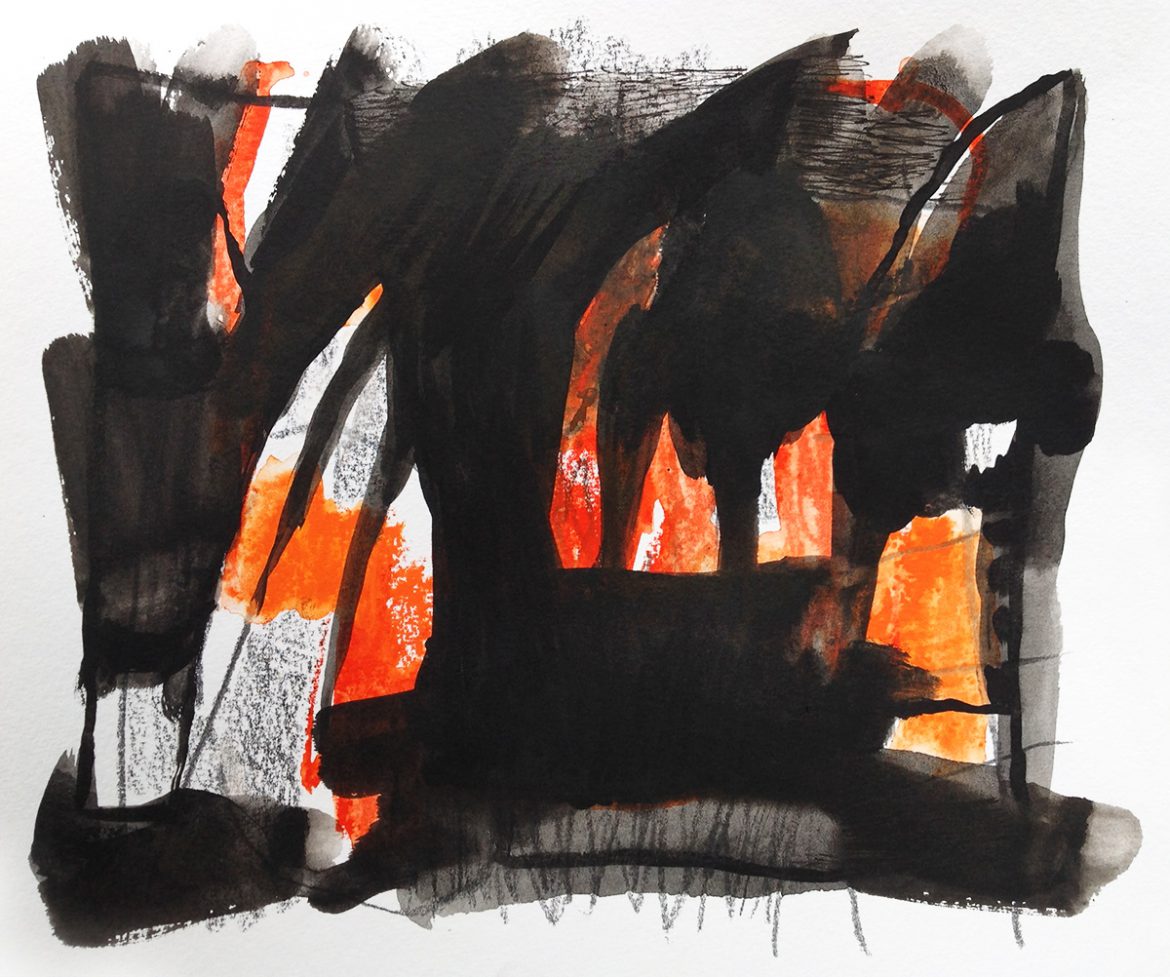We were home when it happened. The first cell of a powerful thunderstorm had swept through that afternoon as we were driving home from a matinee. We watched the sky begin to roil as if haunted by dark ghosts, and then the rain came all at once, slamming across the road and sheeting at the car in torrents. Lightning sparked along the hilltops in quick succession as the wind bent small trees nearly horizontal. We arrived home to find our power out and the phone line dead. I cooked a quick supper on our gas stove. Within an hour the storm seemed to have spent its power and the rain abated. We poured ourselves some wine to relax, then opened a few windows to clear the hot, wet, August air and let the night’s breath in.
At nine-thirty we were reading by headlamp in the living room when the storm kicked up again. By now it was pitch black outside. We heard the thunder, distant at first, then tracked its progress as it growled across the landscape, moving toward us fast. The rain hit first, buffeting the metal roof, and I got up to pull the windows partly closed. We had designed this room for rain, with deep roof overhangs that would let us experience a storm from the inside. A house should be sheltering but not hermetic, we had thought.
The lightning followed hot on the heels of the rain, and now the storm was all around us, flashing and crackling as great trunks of white fire boomed down into the driveway, the backyard, the road, their deafening concussions shaking the house. I tried to return to my reading, but I had never experienced a storm as powerful as this, and I was getting nervous. It didn’t help that the movie we’d seen that day, and indeed the book I was reading, was about magic and witches. The stories are for children, but the imagery is sometimes grimly arresting, and under the crush of this storm—and between the wine and the book and the matinee images reeling in a nearly endless loop inside me—I had started feeling muddled and dizzy, losing hold of the bright line between what was real and what was conjured. Who has sent this demon storm upon us?
Steve was showing no sign of stress, but I got up again to close the windows nearly all the way, a sign my fear had finally taken root. The house shook hard as the lightning struck and struck, switching the sky off and on, from black to white and black again.
I smell smoke.
We leapt from the couch and started searching the house, our noses guiding us. Steve took the downstairs while I checked the kitchen, hallway, bedrooms, bath. Nothing. Steve came back upstairs. Nothing. The fire alarms were all silent. The smell was mostly in the living room. Nothing. I’m going outside, I told him.
I was barefoot but didn’t bother with shoes. I ran down the stairs and out the front entry. The rain was lashing sideways, though the lightning was starting to move on, rattling and fading over the eastern hills. My headlamp flicked at the driveway, the cars, the garden wall. Nothing. I dashed through the carport toward the backyard, and looking up I saw, mixing into the rain, a loose specter of billowing mist—is that mist? What is that?
It’s smoke, it’s smoke—and I ran to find its source, but where—? It seemed to be coming from the back corner of the house, near the place where our propane tank stands on its cement slab, and its line disappears into the wall. But where was the fire?
In the pitch black wet confusion there was nothing, no light at all in the basement or outside it, nothing visible through the basement window, and yet the smoke was blowing now all around me. And as I drew closer, my eyes all blear with rain and smoke, I squinted and looked at—what am I seeing?—a bright white-orange ring around the propane line where it penetrated the wall.
The wall, the wall—it’s in the wall—
I flew to the side door but it was locked. I banged on it bang bang bang so Steve would hear me, and he came fast, his headlamp flashing its single, sharp eye upon me.
The house is on fire, the propane tank—we’ve got to get the cats and get out of here!
I ran inside while he ran past me out the door. My only thought now was for the kittens, the tiny kittens, but where are they?! I caught sight of one, and then the other, but they were skittering ahead of me, panicked by the turmoil and confusion and by my blatant fear as I lunged toward them. They dashed under the bed in the guest room, huddling together in the black corner, completely out of reach. I threw the mattress off the bed and started pulling apart the frame to get at them. I pounced on Rhubarb while Clementine sprang away, scampering down the stairs into the dark basement. I held tight to my prize and took her outside, then threw her into my car and quickly closed the door.
Now—back inside, where is Clementine, where is she? Somehow in the scuffle I had lost my headlamp, so now I needed light. I ran to the kitchen. Steve’s computer was sitting on the island. I opened it, and as it awoke a wash of cool blue light filled the room. I grabbed the laptop and ran with it back downstairs.
Clementine, Clementine—? I tried to make my panicked voice sound cheerful. I saw a little slip of gray dash under a pile of lumber in the back corner of the workshop, and I chased after her. Right above us, I knew, the wall was on fire, with the propane tank nearby. I tried to calm myself so she would not bolt again. I edged toward her—it’s okay, baby, it’s okay—then scooped her up and ran back to the entry, leaving the computer behind as I took her outside, too, and tossed her into the car with her sister.
Back inside now—where is Steve?
We found each other on the stairs. I’ve got the cats, I said. We ran outside. We needed a phone. The line was dead, our cell phones never worked well at our house, and anyway they were now somewhere inside a burning building.
I’ll take my car to the Hanover fire station, Steve said. I can be there in six minutes.
I’ll take mine north, I said, and grabbed my keys, sidling into the car, careful not to let the cats escape.
My house is on fire, my house is on fire. This will be something, though, something to write about. Where did that thought come from? I was addled by fear, by wine and adrenaline, by whatever chemicals the body produces in response to terror.
I raced the two miles north to town, my hazards flashing, looking for a light, for some indication of power and phone. I tore through the small village and out the other side to the volunteer fire station, hoping that maybe, maybe, because of the storms, someone might be within. But all was blackness, empty.
C’mon, c’mon—Somebody! I laid on the horn in sheer frustration, wheeling the car around and heading back into town.
Then, there: a car idling in a driveway, a feeble light inside the house. I pulled in and parked, leaving the car running for its headlights, and got out quickly. A woman was standing at the door with a small child slung on her hip, perhaps just leaving, or just arriving home.
Excuse me—I’m sorry! I need a phone—my house is on fire!
Her face registered her surprise and horror as she quickly led me inside. She dialed 911, then handed me the phone.
I could be anyone, I thought. This could be some weird, elaborate ruse, but this woman trusts me. Why?
The dispatcher swiftly took my details. They’re on their way, he promised.
What happens next?
My brother-in-law is on the Fast Squad, the woman offered. Should I call him, too?
Yes, of course. Thank you. Thank you. And as she placed the call, I worried I was upsetting her child, who was now clinging to her pant leg, looking scared. She hung up. They already know about it, she said. Can I do anything else—?
No, no. Thank you, I said, turning for the door. I’m so sorry I scared your child. And with that I bolted back to the car, my heart still pounding, the woman shouting Good luck! behind me.
The kittens were hiding under the seats now as I sped back through town and turned up the short pitch of road to our house, not certain what I would find—a towering blaze?
No, but more smoke, now, and a large pickup truck in the driveway. A man with a flashlight was circling the house. I parked the car on the lawn and hailed him.
I’m the fire chief, he shouted back. And suddenly behind me the first fire truck roared up and swung confidently into our narrow driveway. Out poured the crew, who confabbed with the chief before leaping into action. They set up lights, started hauling out ladders and hoses and hand tools. And then another fire truck pulled up, the air brakes screaming and spitting to a stop in the road out front, and behind it another, and another, and now the lot was swarming with personnel—professionals in suits and helmets, and volunteers in plain clothes, the men and women who had left their houses and their spouses and their Saturday parties and late night work shifts to come to our rescue.
The chief was shouting orders. How had he gotten here so quickly? One of the volunteers, a neighbor, gave me a hug. Smoke was pouring now from the front of the house through the attic’s gable vent.
I could not regain my bearings. Time seemed an elastic thing, stretching open and closed as each key event in this narrative unfolded. It felt like an eternity since Steve and I had parted—he pointed south and I pointed north—and yet it could not have been more than twenty minutes. My mind was reaching to comprehend, pushing against the thin membrane that separates what is real from what is imagined. My panic was receding, and with it my emotions emptying cleanly out, and in this numbing shock I began to feel no fear, no sadness or anger. Both past and future seemed vague and distant, unmoored from now. My whole goal was simply to act, respond, survive.
Where’s Steve?
And then he suddenly appeared, hastening up the road on foot, as the fire trucks had made it completely impassible. We hugged, and the chief broke from his crew to call us over.
I’ve assumed possession of the house, he informed us. (We later learned this is standard practice in an emergency. The head of the response team, not the owners, makes all decisions.) His crew was working to contain the fire, and then would chase it along the walls and ceiling to make sure it hadn’t walked.
Did you find the extinguishers? Steve asked him.
Extinguishers? I thought. What extinguishers?
Yes, the chief replied. I tried to use them, but I didn’t have an axe in my truck. I did have all these water bottles from the road race today, and I couldn’t find the hose, so I was trying to pour them on the house.
What are they talking about? This all seemed so surreal, so nonsensical.
The chief went back to his crew, who were busying themselves with ladders and axes. Steve and I stood out of the way. Inside my car, the kitties had crawled out from under the seats and were now lounging on the dashboard, happily tracking the proceedings, their bright faces lit by night floodlights and the twinkling of red flashers.
Extinguishers? I asked him.
While you were hunting cats, he said, I grabbed our extinguishers and dashed out back. I turned off the tank’s main valve, then tried to lever the siding apart to point the extinguisher at the source. But I couldn’t claw it free, so I tried at least to muscle the tank away. But the propane hose was so stiff, the tank wouldn’t budge. I would have had to disconnect the hose, which meant a wrench, which meant re-entering the basement, which meant time, and—
And so, in that split instant, he had chosen safety instead. Just before he’d met me on the stairs, he’d fled the fire and set the two extinguishers in full view in the driveway, hoping that maybe, maybe, whoever responded first would find them and use them. That person had.
The crew had settled into work mode now and seemed to be getting the fire contained. Steve and I strode up the lawn to get a better view. The back corner of the house—our master bedroom—looked as if it had been blasted apart by an explosion, and the lawn was strewn with debris. The crew had smashed out one window and torn open the wall on both sides, and through this hole they’d pitched the nightstand, the pillows and bedding, the bed frame and mattress, whatever was in their way. Chasing the fire meant, we now recognized, hacking the house apart to make sure it hadn’t insinuated itself into crevices and cavities. Outside, they had peeled off shingles and strapping and flashing. Off came the 2” thick foam board we had wrapped around the old house to make it better insulated. All this litter on our lawn was now soaking wet, not so much from the rainstorm, which by now had mostly trickled out, but from—of course—the fire hoses, which had dumped hundreds of gallons of water onto, and into, our house.
It’s out, the chief declared. I’m just about to turn the property back over to you. You can go inside now, if you want, to, if you need anything.
Need anything… My need knows no bounds.
We ventured in. The crew clunked around us in their heavy boots, leaving a trail of soot and clotted insulation on our new floors. The smoke had cleared, but its smell was thick and acrid. The bedroom was a wreck, a total loss, its walls charred through and soaking. The crew had chopped open the ceiling and—whoosh! they told us—down upon them had tumbled an avalanche of brand new insulation, which now lay in a heap in the center of the room.
I grabbed our camera and strayed back outside, snapping a few shots of the devastation. The flash jumped eerily off the reflective stripes on the workers’ togs. They began coiling up their hoses and nailing plywood over the house’s gaping hole to secure it from the elements. The raging elements. Some of them were standing idly by, now, chatting and joking with each other. This was not their trauma; it was my trauma, our trauma.
I borrowed one of the worker’s cell phones and I called our friends K. and T. It was late, nearly 10:30, but they were still awake.
Um, (where do I start?) our house was struck by lightning, and it started a fire. We’re okay, and… the house is mostly okay… but we need a place to sleep. Can we come over?
What must they have thought? Of course, they said, of course.
Back inside, I found Steve again and we cast around trying to decide what to take with us. But what, beside toothbrush and comb, did we really need? Emergencies have a way of flushing past and future tenses from the mind, so that what remains is only now: What do I do now? What do I need now? We were no longer fleeing a burning building. We needn’t think of the photo negative, the birth certificate, the heirloom jewelry. We were fleeing a building that was merely afflicted, ravaged but safe to enter. What does one need, really, to live another day?
The computer. A few key files. Insurance documents. A change of clothes. Our cell phones. My purse, his wallet. The cat box, their food. And—what else? On my way out, I noticed the bottle of wine a friend had given me just days before: Louis Roederer Cristal champagne, vintage 1996. It was worth $400—I knew, because I had done the research and told him what he had, and this is what had prompted him to give it to me. He was a single-malt guy, he said. Here, take it. You deserve it. And so there it was by the door, a symbol of refinement, of celebration, of civilization.
I put it into the trunk alongside the cat box and a bag of clothes. And we climbed into our cars, and headed to our friends’ house, and then we all slept.
Excerpted from Making it Home, a book-length manuscript submitted in partial completion of the degree of Master of Arts in Liberal Studies/Creative Writing, Dartmouth College, April 2011.
Original artwork by Meg Houston Maker, June 2015.




